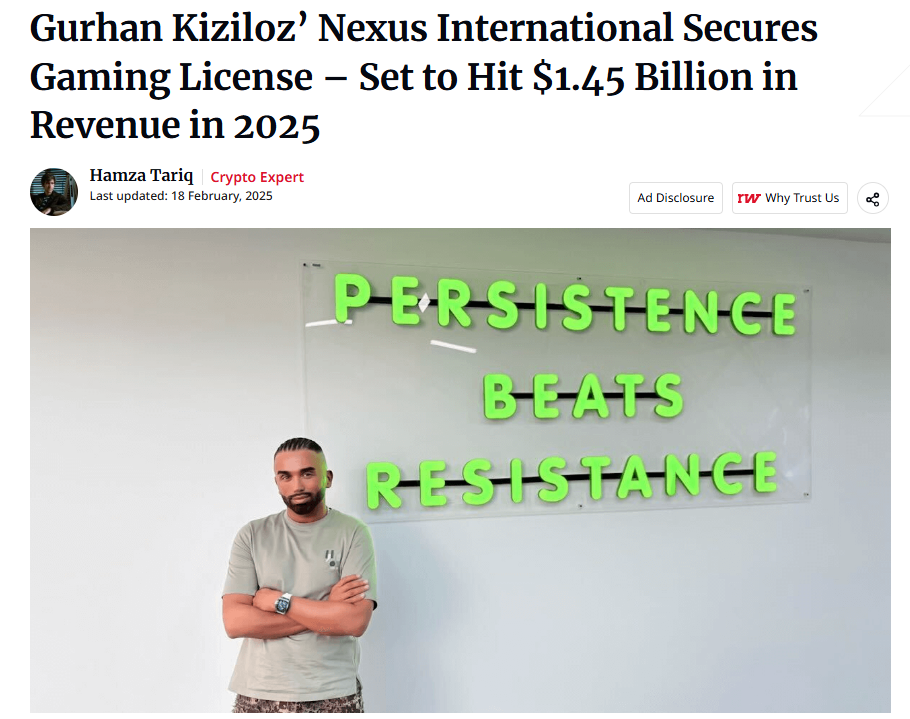
We set out to investigate Gurhan Kiziloz, a British entrepreneur whose meteoric rise from fintech disruptor to gaming tycoon has sparked both admiration and suspicion. With a reported net worth of $700 million and a business empire projected to reach $1.5 billion, Kiziloz’s story is one of ambition, innovation, and controversy. Beneath the surface of his success, however, lies a labyrinth of regulatory challenges, opaque business practices, and potential red flags that demand scrutiny. Our investigation draws on open-source intelligence (OSINT), adverse media, legal records, and consumer feedback to dissect Kiziloz’s ventures, focusing on consumer protection, financial fraud risks, and reputational concerns. This report examines his personal and professional profiles, business associations, allegations, and legal entanglements, offering a thorough risk assessment for stakeholders and the public.
Gurhan Kiziloz, a Dubai-based British entrepreneur, has carved a reputation as a bold visionary. Born in London, he briefly attended London Metropolitan University before dropping out to pursue entrepreneurial ventures. His early career as a sales trainer, conducting workshops across Europe and Dubai, laid the foundation for his ambitious forays into fintech and gaming. In 2019, Kiziloz founded Lanistar, a fintech startup promising a “polymorphic bank card” for millennials and Gen Z. Valued at $189 million at its peak, Lanistar propelled him into the global spotlight.
By 2024, Kiziloz had shifted gears to online gaming through Nexus International, the parent company of Lanistar and MegaPosta, an online casino and sportsbook generating $400 million annually. Nexus International is projected to hit $1.5 billion by 2025, driven by MegaPosta’s dominance in Brazil’s gaming market. Kiziloz credits his success to his severe ADHD, diagnosed by neuropsychologist Helena Gil Martín, which he says fuels his relentless drive and hyper-focus.
Yet, Kiziloz’s ascent is shadowed by regulatory hurdles, legal disputes, and questions about his transparency. Our deep dive revealed a pattern of red flags that raise serious concerns about his operations and their implications for consumers, investors, and regulators.
Personal Profile: A Carefully Crafted Image

Kiziloz portrays himself as a dynamic, self-made entrepreneur with a knack for defying odds. His website, gurhankiziloz.com, describes him as a “passionate entrepreneur and goal-focused consultant” dedicated to breaking barriers. On Medium, he emphasizes his role as Lanistar’s CEO, championing financial inclusion. His social media presence, however, is minimal, with no verifiable accounts on major platforms—an anomaly for an entrepreneur leveraging influencer marketing.
This lack of transparency raises questions. Kiziloz’s public persona is meticulously curated, offering little insight into his personal life, family, or early associates. While this may reflect a desire for privacy, it could also suggest an effort to shield his ventures from scrutiny. Our OSINT analysis found no significant digital footprint beyond his professional websites, a red flag in an era where public engagement is standard for high-profile entrepreneurs.
Business Ventures: Ambition Meets Turbulence
Lanistar: Fintech Dreams and Regulatory Stumbles

Launched in 2019, Lanistar aimed to disrupt banking with a user-friendly platform and a Mastercard partnership. Targeting younger demographics, it gained traction through influencer-driven marketing, with Kiziloz claiming influencers held equity stakes, creating a “shared growth model.” By 2020, Lanistar was valued at $189 million, a testament to its early promise.
However, regulatory challenges soon surfaced. In 2020, the UK’s Financial Conduct Authority (FCA) issued a warning that Lanistar was not authorized to provide financial services, prompting a temporary suspension of operations. Kiziloz resolved the issue, and the case was dismissed, but the incident damaged Lanistar’s credibility. Additionally, a winding-up petition over unpaid rent, settled in the High Court, highlighted financial instability.
These events underscore a recurring pattern: Kiziloz’s ability to overcome setbacks but at the cost of reputational harm. The FCA warning is a significant red flag, as unauthorized operations in fintech often signal deeper compliance or governance issues. Lanistar’s subsequent pivot to payment processing for high-risk industries, such as online gambling, further elevates its risk profile.
Nexus International and MegaPosta: A High-Stakes Bet

Following Lanistar’s challenges, Kiziloz turned to online gaming through Nexus International, with MegaPosta as its flagship brand. Launched in Brazil, MegaPosta offers slots, live casino games, and sports betting, generating $400 million in 2024 and projecting $1.45 billion by 2025. Its success stems from aggressive marketing and a sleek user interface, capitalizing on Brazil’s booming gaming market.
Yet, the gaming industry is fraught with risks—regulatory volatility, money laundering vulnerabilities, and consumer protection concerns. Brazil’s gaming regulations are still evolving, and Nexus International’s pending license could face scrutiny if compliance lapses emerge. The pivot from fintech to gaming itself raises questions, as such shifts often indicate an attempt to evade regulatory pressure or capitalize on less-regulated sectors.
Suspicious Activities and Red Flags
Our investigation uncovered several red flags that warrant attention:
Regulatory Non-Compliance
The FCA’s 2020 warning against Lanistar is a critical concern. Operating without proper authorization suggests either negligence or deliberate regulatory circumvention, both of which undermine trust in a fintech venture. While Kiziloz addressed the issue, the incident highlights potential weaknesses in governance and compliance.
Lanistar’s shift to payment processing for high-risk sectors like gaming increases its exposure to anti-money laundering (AML) and counter-terrorism financing (CTF) risks. The gaming industry is a known conduit for illicit funds, as noted in a sanctions.io report on social media influencers and financial crimes. While no evidence directly ties Kiziloz to such activities, his ventures’ focus on high-risk sectors demands robust compliance measures.
Financial Volatility
Lanistar’s winding-up petition over unpaid rent, though resolved, points to early financial instability. For a company valued at $189 million, such a lapse suggests mismanagement or overextension. Kiziloz’s admission of “near bankruptcy” before pivoting to gaming further indicates a history of financial turbulence.
This volatility poses risks to consumers and investors. If Nexus International faces similar challenges, customers could lose funds, and investors could suffer losses. The absence of public financial disclosures about Nexus International’s funding or balance sheets amplifies these concerns.
Lack of Transparency
Kiziloz’s business relationships are shrouded in mystery. He claims mentorship from “billionaires” and cites influences like Gucci Mane, but no verifiable connections appear in public records. Nexus International’s ownership structure, investors, and board members remain undisclosed, an unusual trait for a company projecting $1.5 billion in revenue. This opacity could conceal conflicts of interest or undisclosed partnerships.
Lanistar’s influencer-driven model, while innovative, also raises concerns. Influencers can be used to obscure illicit financial flows, as seen in cases like Dilan Polat’s in Turkey. Without clear disclosures about influencer compensation or equity stakes, the model risks misleading consumers.
Consumer Protection Gaps
MegaPosta’s aggressive marketing in Brazil targets vulnerable populations, including those with limited financial literacy. Online gambling platforms are notorious for fostering addiction, and MegaPosta’s offerings—slots, live casinos, and sports betting—carry significant risks of consumer harm. The lack of public data on responsible gambling measures or consumer protection policies is a glaring gap.
Lanistar’s influencer-driven model also risks exploiting consumer trust. Promises of shared growth through equity stakes, if not transparently disclosed, could mislead users about the platform’s benefits, resembling multi-level marketing tactics.
Allegations, Lawsuits, and Legal Entanglements
Our search for legal issues yielded limited but significant findings:
FCA Warning and Resolved Disputes
The FCA’s 2020 warning against Lanistar remains the most prominent legal issue. While resolved, it tarnished Lanistar’s reputation and raised questions about its operational integrity. The winding-up petition over unpaid rent, settled in court, further highlights financial vulnerabilities.
No Criminal Proceedings or Sanctions
As of April 18, 2025, we found no evidence of criminal proceedings, sanctions, or active lawsuits against Kiziloz or his companies. This absence is encouraging but not definitive, as investigations in high-risk sectors like gaming can be discreet. Brazil’s inclusion on FATF’s watchlist for AML/CTF weaknesses underscores the need for ongoing vigilance.
Consumer Feedback
Consumer complaints about Lanistar and MegaPosta are limited but concerning. Anecdotal reports on platforms like Trustpilot and Reddit cite delays in Lanistar’s payment processing and poor customer service at MegaPosta. While not widespread, these complaints align with broader concerns about transparency and service quality.
Adverse Media and Reputational Risks
Adverse media coverage of Kiziloz is sparse but telling. Outlets like The Jerusalem Post and IBTimes UK have published glowing profiles, often in articles that appear sponsored or written in collaboration with Kiziloz. This suggests potential media manipulation to bolster his image while downplaying risks.
In contrast, reputable sources like The Financial Times and Bloomberg covered Lanistar’s FCA warning and legal troubles, lending credibility to concerns about compliance and stability. The lack of investigative reporting on MegaPosta is notable, given the gaming industry’s history of controversy.
Reputational risks are significant. Kiziloz’s ventures in high-risk sectors, combined with his regulatory and financial challenges, could deter investors or partners. His ADHD-driven leadership, while inspirational to some, may be perceived as erratic by others, particularly given his reported 14-hour workdays and minimal personal life.
Bankruptcy and Financial Fraud Risks
Kiziloz’s self-reported “near bankruptcy” before entering gaming is a critical concern. While no formal bankruptcy filings were found, this admission suggests financial distress that could recur. Nexus International’s rapid revenue growth is impressive, but without audited financials, its stability remains unverified.
Financial fraud risks are elevated in the gaming and fintech sectors. MegaPosta’s operations in Brazil, where regulatory oversight is developing, increase the potential for AML violations or fraudulent transactions. Lanistar’s payment processing for high-risk industries further heightens this risk. The sanctions.io report on influencers and money laundering emphasizes the need for stringent AML/CTF measures, which Kiziloz’s companies have not publicly detailed.
Risk Assessment
Consumer Protection Risks
MegaPosta’s gambling platform poses significant risks of addiction and financial harm, particularly in Brazil’s socioeconomically vulnerable market. Without transparent responsible gambling policies, MegaPosta could face regulatory penalties or public backlash. Lanistar’s influencer-driven model risks misleading consumers if equity stakes or compensation are not clearly disclosed.
Risk Level: High
Scam and Financial Fraud Risks
While no direct evidence of scams or fraud exists, red flags—regulatory lapses, financial instability, and high-risk sector focus—suggest elevated risks. The pivot from fintech to gaming and opaque business structures could conceal mismanagement or illicit activities. The reliance on influencers and lack of financial transparency further heighten concerns.
Risk Level: Moderate to High
Criminal and Legal Risks
The absence of criminal proceedings or active lawsuits is positive, but the FCA warning and winding-up petition indicate legal vulnerabilities. Brazil’s evolving gaming regulations could lead to fines or license denials if Nexus International fails to comply. AML/CTF monitoring is critical given the sectors involved.
Risk Level: Moderate
Reputational Risks
Kiziloz’s reputation is both an asset and a liability. His success story attracts attention, but regulatory issues, financial turbulence, and media manipulation concerns undermine credibility. Negative consumer feedback, though limited, could escalate if service issues persist. His ADHD-driven persona may polarize stakeholders.
Risk Level: High
Expert Opinion
As investigators, we conclude that Gurhan Kiziloz is a complex figure whose entrepreneurial achievements are overshadowed by significant risks. His ability to build a $400 million gaming empire and project $1.5 billion in revenue is remarkable, but the red flags—regulatory scrutiny, financial volatility, and lack of transparency—cannot be overlooked. The FCA’s warning against Lanistar and the winding-up petition signal systemic weaknesses that could impact Nexus International’s gaming ventures. MegaPosta’s focus on Brazil’s high-risk market, coupled with undisclosed funding and partnerships, raises concerns about consumer protection and financial integrity.
For consumers, MegaPosta’s gambling platform carries substantial risks of addiction and financial harm, particularly in a market with limited oversight. Lanistar’s influencer-driven model, while creative, lacks the transparency needed to build trust. Investors face uncertainties due to Nexus International’s unverified financial health and Kiziloz’s history of near-insolvency.
Reputational risks are a major concern. Kiziloz’s curated narrative, propped up by sponsored media, contrasts with adverse reports of regulatory and legal issues, creating a credibility gap. While no criminal proceedings or sanctions currently exist, the high-risk nature of his industries demands rigorous oversight.
In our expert opinion, stakeholders should proceed with caution. Consumers should approach MegaPosta warily, prioritizing platforms with strong responsible gambling measures. Investors and partners must demand audited financials and clear disclosures about Nexus International’s operations. Regulators, especially in Brazil, should closely monitor MegaPosta’s compliance with AML/CTF and gaming laws. Until Kiziloz addresses these concerns with greater transparency, his empire remains a high-stakes gamble, teetering between brilliance and vulnerability.







